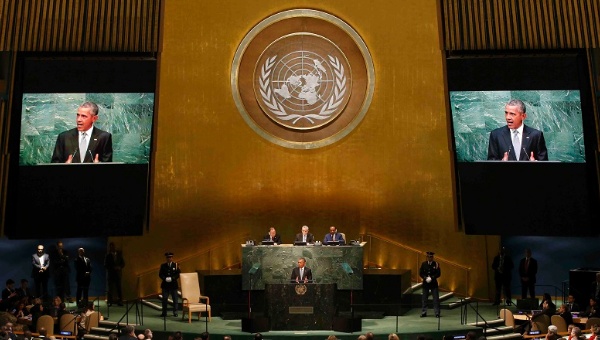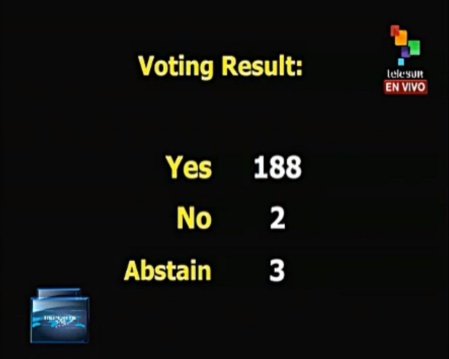
Considering Cuba’s resolution against the U.S. embargo at the UN
WASHINGTON, D.C. – Spoiler alert: On Tuesday, the United Nations General Assembly will consider Cuba’s resolution on the “Necessity of ending the economic, commercial and financial embargo imposed by the United States of America on Cuba.” The vote is not in doubt; a similar resolution condemning the U.S. embargo was adopted by a 188-2 margin last year. We freely admit that virtually no one takes this process as seriously as we do; news organizations tend to yawn, since the General Assembly has adopted these measures for 23 consecutive years, and are likely to yawn harder this year, now that the State Department has denied the rumor the U.S. would abstain rather than vote against the resolution, taking away any remaining mystery about next week’s vote.
What’s the big deal? If the press doesn’t care, why should you? After all, we know how the vote will go down and, at this new, more hopeful stage in U.S.-Cuba relations, isn’t the resolution, the vote, and the analysis just a set piece from another day? That’s apparently what U.S. officials believe, who say they tried to get the Cubans to water down the resolution and take greater note of what diplomacy has produced so far, but felt rebuffed. In their telling, that ended the chance for a U.S. abstention. So, is there anything here that should concern any one of us?
Nerd Alert: We think so. Typically, the embargo resolutions request the UN Secretary-General to compile a summary of how UN agencies and each member nation of the General Assembly are affected by the global reach of U.S. economic sanctions. Every year, that report is “embargoed” by the UN until the eve of the vote. When we get our copy, as we did this week, the effect it has on one member of our team would remind Steve Martin fans of Navin R. Johnson’s reaction when he discovers his name in the phone book for the first time.
Getting serious for just a moment, we suggest you either read the report yourself here, or take a look at the analysis that follows. In fact, what came back in the Secretary-General’s report is pretty interesting, and here are some of the big themes that captured our attention.
The diplomatic breakthrough with Cuba bought the U.S. a lot of good will. Comments filed by Member states – allies and adversaries alike – recognize the Obama administration for talking to Cuba and making an effort to have a respectful policy. While President Obama had in previous years made reforms on travel and remittances, and no country took notice, several nations and UN agencies mentioned the opening of embassies, ending Cuba’s listing as a state sponsor of terror,reforms that allow greater travel, the export of building materials to repair homes, and the like as welcomed steps forward. The report has never praised the U.S. before.
But that goodwill stretches only so far. Japan, for example, expressed support for the new, positive direction of the U.S.-Cuba relationship, but will support the resolution condemning the embargo because it imposes hardships on Cubans and because the extraterritorial reach of sanctions violates international law. Similarly, the European Union – allies whose policy toward Cuba is most like ours and welcomed the bilateral breakthrough – also believes “the United States measures are increasingly outdated and should be ended.”
Then, there are the comments by the Office of the United Nations High Commissioner for Human Rights which says that coercive economic sanctions justified on human rights grounds more often than not fail to improve those conditions, and punish the poorest people, the intended beneficiaries,at the cost of increased unemployment and poverty and risks to their health. It stings to read the example it offers that there is increased risk of mortality in Cuba because our sanctions restrict its access to chemicals that would otherwise protect Cuba’s drinking water.
From Stinging to Strange to Stupid. Those who are cynical about the UN, those who are bored writing or reading the annual stories on General Assembly vote, might spend time reading the impact the embargo continues to have on vulnerable Cubans.
In the report, you can read about sanctions blocking Cuban access to diagnostic equipment for monitoring the treatment of leukemia patients; how sanctions prevent the sale to Cuban hospitals of devices critical for pediatric heart surgery patients; how sanctions hinder efforts by the UN Development Program getting medicine and support into Cuba for its 18,257 patients, people of all ages, living with HIV/AIDS. You can read about the month-long cutoff of funds that Cuba’s government needed to pay for the housing and food costs for the Cuban doctors who were deployed in West Africa to fight Ebola.
On a lighter note, Cuba wants you to know that while it could be buying baseballs from the Wilson Sporting Goods Co., headquartered in Chicago, Illinois, at $5.80 apiece, the embargo forces it to turn to a Japanese baseball manufacturer and spend $9.50 so that each ball can make its way to Cuba. For some reason, Cuba would also like you to know that because of the U.S. embargo, it has to spend over $35,000 more buying saxophones for 334 student musicians than it would if only it could purchase instruments made by Selmer in Elkhart, Indiana. Cuba: Point taken!
The report lays bare the economic contradictions of our policy. The great change in direction offered by President Obama’s new policy is that we’re supposed to stop strangling Cuba economically and instead give support to what can help make Cubans prosperous.
With the embargo, however, our new policy still has the old effects. For example, the Secretary-General’s report is a reminder that we close off to Cuba its natural, most proximate export market.
The embargo stops Cuba from selling its biotechnology and medical services, its nickel, rum, cigars, coffee, lobsters, and honey to the eager consumers it would find in the U.S.A. The embargo stops Cuba from getting credit, it subjects Cuba to exchange rate risk, it places Cuban bank accounts and its funds in jeopardy of being seized, and it bans Cuba from using the U.S. dollar in international transactions. On top of the well-known problems that are due to Cuba’s own economic policies, our embargo is a brake on Cuban economic growth and increases the struggles of the Cuban people.
Next Steps? After a really exciting year for U.S.-Cuba diplomacy, and strong leadership in the U.S.by President Obama on behalf of engagement, the Secretary-General’s report reminds us that the embargo is still in place and it cuts pretty sharp.
For its part, Cuba’s resolution and its lengthy section in the UN Report is focused on nudging President Obama to try harder, to use his executive authority again and again, because Congress doesn’t have the votes to lift the embargo.
Cuba wants President Obama to help Cuba secure credit, use the dollar, open the banking system to Cuban entities and financial transactions, allow it to use the International Financial Institutions, and permit U.S. investment. He can do those things, and he should, but a year from now, are we going to be having the same debate, over the same resolution, covered or ignored by the same cynical press corps? Or, are there things that both governments are prepared to do in order to move the process along, further and faster?
(From Cuba Central)

